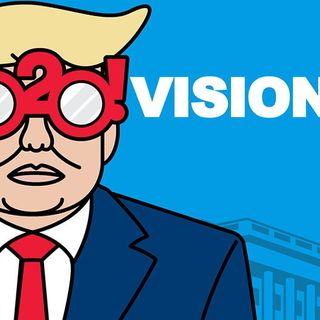The odds of Trump being impeached are uncertain. But the impeachment inquiry will lead to political turmoil.
Over the past ten days we have witnessed a snowball of suspicion turn into an avalanche of evidence that the president Donald Trump used monetary leverage in form of US military aid to make the Ukrainian government ramp up an investigation into his likely 2020 presidential campaign opponent. While the Democratic Party leadership in Congress largely resisted the various calls to begin an impeachment inquiry into the president for a myriad of other reasons that could fall into the category of “Treason, Bribery, or other high Crimes and Misdemeanours,” the allegations that surfaced as a result of the whistleblower’s complaint have made them change their minds. Officially, on 24 September, the president of the United States became subject of an impeachment inquiry that could lead to a formal vote on impeachment in the House of Representatives and a subsequent trial in the Senate, putting his political survival into question.

The road to the impeachment inquiry
The bets that president Trump would be impeached and perhaps even removed from the office started even before he assumed the highest office. Those bets were originally founded on the allegations that the president had been in breach of the emoluments clause of the Constitution from day one. Along with that, there were the mounting suspicions over the nature of then candidate Trump’s dealings with the representatives of Russian Federation’s government during the 2016 election campaign which has led to the FBI and special prosecutor investigations. This brought about the broader charges of potential obstruction of justice as the president tried to stymie the investigatory and prosecutorial efforts. However, all of these potentially disqualifying accusations have not been enough to begin a process that would have the prospect of seeing president Trump out of the White House before the regular election.
While the previous allegations of the president’s misdoings were not unfounded, they were more tenuous and less straightforward than what has emerged out of the complaint raised by a whistleblower who has been a CIA officer in the White House. The report is damning, as it lays out a persuasive narrative of a president who has abused his executive power by ordering to withhold congressionally approved aid from Ukraine. This was not long before he would speak to the president of Ukraine Volodymyr Zelensky and press him to investigate the current frontrunner in the Democratic primaries campaign and former vice president Joe Biden and his son Hunter. The whistleblower’s report also details a number of other instances which seem to suggest the president misused the interagency process and instructed other parts of the executive branch to take part in the efforts led by his personal lawyer Rudy Giuliani to smear the Bidens.
Since stepping back into the role of the Speaker of the House, Nancy Pelosi has tried to fend off the calls from some of the most vocal and popular fellow Democrats to impeach the president. Pelosi maintained that such strategy could be perilous and had the potential to backfire, so the Democrats’ best course of action would be to weather the next two years, given they don’t have the majority in the Senate, and focus on maximising the election prospects of a Democratic presidential candidate in 2020. The only thing that could make her change her mind, she said, would be the unearthing of something truly compelling and overwhelming — the whistleblower’s complaint proved to be just that. It changed the tides within the Democratic Party since even the more moderate members of the caucus became convinced there was no alternative but to begin an impeachment inquiry, which Pelosi announced in a speech on September 24.
Historical analogies are aplenty and all promise more contentious politics
As the inquiry in the House takes off, there are plenty of different scenarios that have been sketched out as to how it is going to proceed. Historical analogies, while imperfect, could be instructive as to the promises and perils of such a process. The most recent instance was the 1998 impeachment of president Bill Clinton, which in the short-term backfired on the House Republicans who voted for the articles of impeachment based on the charges of perjury and obstruction of justice. They fell short of the two-thirds majority in the Senate and saw the president leave the White House with over 65 percent public approval. Yet, George W. Bush successfully used the impeachment in his 2000 campaign promising he would “restore honor and dignity” to the Oval Office.
There are also lessons to be learned from the Watergate and what would have been a certain impeachment had it not been for Richard Nixon’s resignation. Today, Watergate is synonymous with the abuse of presidential power and corrupt practices, though it was really not clear until very late in the impeachment inquiry that it would indeed result in Nixon’s removal from the office. While Democrats largely benefitted from this process — as evidenced in the strong 1974 midterm victory and Jimmy Carter’s election in 1976, Watergate had a detrimental impact on the aggregate and long-term public trust in government institutions. Paradoxically, this has hurt the Democrats more as they are the party that generally favours a larger role for government in dealing with national issues.
Yet, another, not too distant, historical example, shows us that presidents can avoid strong cases for impeachment. The Iran-Contra affair was a scandal, which had all the makings of the impeachment of a sitting president, but ultimately concluded in an anti-climax. President Ronald Reagan proved to be a Teflon-president as he managed to brush off the allegations he was aware of of the action of the National Security Council. Moreover, due to the delaying tactics and presidential pardons, those who were deeply involved in the scheme of selling arms to Iran and funding Nicaraguan Contras with the proceeds from arms sales largely walked free. Given the Republicans currently control the Senate, there are even speculations that one of the tactics Mitch McConnell as the Senate Majority Leader could employ is to do something akin to the Iran-Contra investigation playbook and slow down or even stonewall the trial.
Despite the prolific punditry that is filling the airwaves and news columns, no one knows who is going to benefit the most from the impeachment inquiry. However, the potential for all the involved parties to suffer great political damage is huge. The only certainty is that the next thirteen months are going to bring more mess and divisions within the American body politic on top of what was already poised to be a contentious election campaign.






